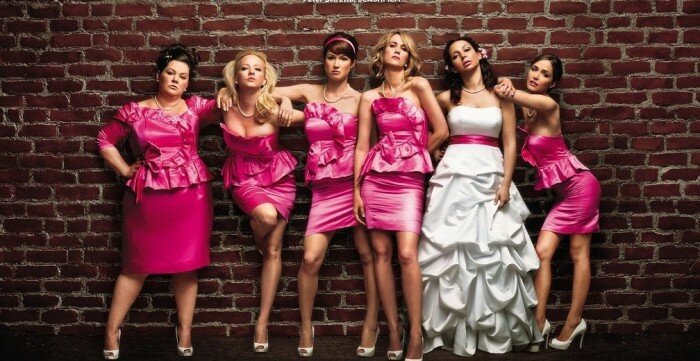
It's the Thursday after the Oscars and I am only, just now, wiping the crust out of my eyes from staying up past ten on a school night. Why, Universe, does that telecast have to be broadcast on a Sunday? Saturday, please. Then I can sleep off my hangover without guilt. Thanks.
I normally don't participate in the Monday night quarterbacking that happens the days after the Oscar telecast because the focus is largely on the fashions and I, quite frankly, couldn't care less about who wore what. I did, however, catch a wrap-up show on a cable channel where they were discussing the merits of the film Bridesmaids and I stopped the clicker long enough to hear a critic I quite respect describe the film's two Oscar nominations as "undeserving" and referred to its critical reception as "overblown". The reason: women pooped in a sink and it was "unbecoming".
Now, I will agree, I find it tiresome that the popular focus for the movie is based, primarily, on the dress-fitting scene and the gross out that inevitably happens in the bathroom of that pristine-no-longer shop (and make no mistake, though the scene is not for everyone, there can be no dispute: it was hilarious). But, really? That was all the movie was about for you?
Hollywood has frequently felt that a woman's place in comedy was largely suppose to be in pursuit of a wedding ring which is why I almost didn't go and see this movie and why haven't watch a single Kate Hudson film since Almost Famous. I am simply not down with devoting two hours of my life to watching a starlet lasso Matthew McConaghey into marriage, all whilst balancing herself on 5-inch high heels. But, Bridesmaids isn't a movie about weddings, people. It's about the way women talk to each other. There just happens to be a wedding in it. And some women pooping in a sink. What Kristen Wiig and her co-writer, Annie Mumolo, have managed to traffic in here is a sort of social realism that outside of a Mike Leigh Film, very rarely gets mined in a film. They have tried to capture the strength that certain woman need to carry on in the face of common societal pressures. Friendship, love, courtship, marriage and the promise it holds of life-ever-after are all held up to scrutiny here and what they reveal is that they are not quite what they are cracked up to be.
Maid of Honor Annie and her motley crew of bridesmaids know this only too well. There is the gentle, almost childlike bridesmaid who confesses her discontent with never having sex. The bridesmaid mom who confesses her horror at sharing the house with three lively teenage sons ("There's semen everywhere. One blanket actually cracked") and at her husband's banal, insatiable conjugal needs: ("I just want to watch the Daily Show once, without him entering me"). Annie's own sense of failure is only amplified and accelerated by the intolerable social and financial humiliation of being a bridesmaid and it threatens to poison everything, including a promising new relationship with a nice cop. But it is Helen - sweet, sweet, passive-agressive Helen!- whose uber-competitiveness in taking over her role as Lillian BFF that lurches Annie into existential overload. It isn't enough that Annie continues to share an apartment with a sibling duo, works a menial job and is struggling to pay rent. Now she has to endure the indignity of attending a Helen-curated party for which she had been mastermind. And say nothing.
Genius.
And then throw on top of this Melissa McCarthy, whose character, early on, seems like a caricature. Overweight and unfiltered in the early scenes, by film's end, she has slowly subverted these impressions, and gains depth as the most selfless member of the bridesmaids, understanding that you don’t receive your own happiness as much as you make it. Find me another movie where a woman over 150 pounds was the moral center? Or who turns out to have the most self-actualized and fulfilling sex life ?
Good comedy should mine human foibles for comic effect and, sometimes, writers and actors need to exaggerate character flaws to make their point (and get the laughs). Sink-pooping aside, Bridesmaids worked as well as it did because the writing and the feelings behind it resonated and rang true. Sure, few of us have gone to a bridal shower and destroyed a cheesy decoration in a fit of frustration with the unreality of it all. But who among us hasn't wanted to? Am I surprised that a certain portion of the population has missed the point there? No. Am I thankful that someone had the audacity to write about it. Hell, yeah.
